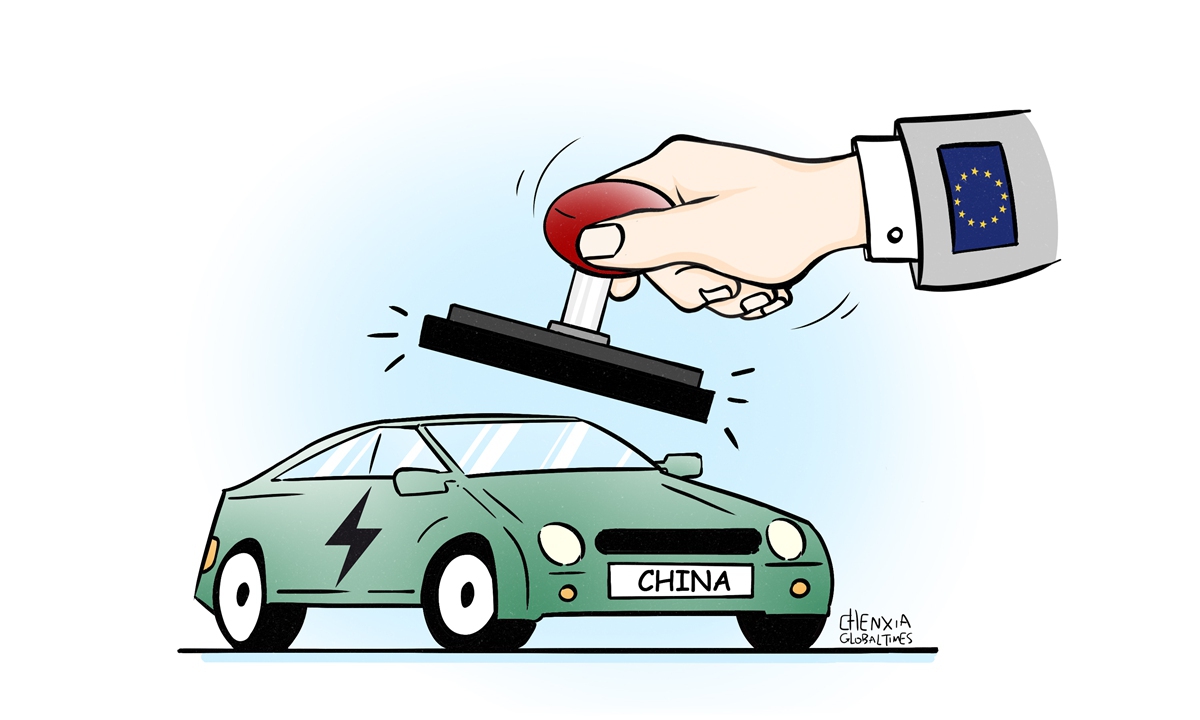
Illustration: Chen Xia/Global Times
As the EU considers imposing additional tariffs on Chinese electric vehicles (EVs), national governments across the bloc are fiercely competing for a share of the manufacturing investment and jobs by dangling incentives to attract Chinese automakers looking to build European factories, Reuters reported on Monday.
With the global auto market facing the challenges of fluctuating demand, pressure for technological innovation and rising environmental standards, how the EU will deal with Chinese manufacturing has become a topic of great concern. The bloc's ability to rely on market mechanisms rather than intervention to address its own challenges is crucial, not only for the future of the European auto industry, but also as a significant test of European economic competitiveness and innovation capacity.
Chinese Foreign Ministry spokesperson Lin Jian said on Tuesday that China has repeatedly stated that the essence of the EU's probe against Chinese EVs is trade protectionism, urging the bloc to terminate the investigation as soon as possible to avoid harming the stability of China-EU economic and trade cooperation and industrial supply chains. Lin also reiterated that China will take all necessary measures to firmly defend its legitimate rights and interests.
There is no denying that the European auto industry, a crucial pillar of the global vehicle market, has faced unprecedented challenges in recent years. Uncertainty in the global economy has caused fluctuations in consumer confidence, affecting car sales. Meanwhile, the rapid advance of technology, particularly the shifts toward electrification, intelligence and networking, necessitates huge investments by carmakers to maintain competitiveness and meet strict environmental regulations and standards.
Against this backdrop, some auto parts giants have resorted to layoffs to address their predicament. Germany's second-largest automotive component supplier ZF announced in January that it would close two manufacturing plants and cut up to 12,000 jobs from its German workforce, while French automotive supplier Valeo has said it would cut 1,150 jobs.
It is under such circumstances that the rapid growth of China's manufacturing industry, particularly for EVs, has emerged as a significant phenomenon in the global economy. Chinese companies have not only achieved impressive success in the domestic market but have also begun to extend their influence in the international market by leveraging their strengths in cost management, market penetration and technological innovation, making them attractive potential investors for European nations.
The active pursuit of Chinese investments by European countries demonstrated that there is still a lot of room for collaboration between China and Europe in the automotive industrial chain, despite normal market competition.
China's achievements in EVs can be attributed largely to its emphasis on free market competition. By fostering a culture of technological innovation and market expansion, China has successfully propelled this industry forward. This market-driven approach not only accelerates China's industry growth but can also serve as a source of reference for the European manufacturing sector.
While some in Europe may consider tariffs as an effective means to attract Chinese manufacturing, European countries should recognize the significance of market mechanisms when it comes to regulating resource allocation and fostering industrial growth. Excessive intervention can disrupt market competition and harm the industry's long-term prospects. Therefore, Europe should adhere to market principles when seeking Chinese investments, allowing for fair competition.
As a form of trade protection, tariffs may provide short-term benefits to the European auto industry, but they could impede market and industrial development in the long run. Excessive reliance on tariffs not only harms Europe's investment environment but also stifles industrial innovation. Europe should instead prioritize market mechanisms to foster innovation and competitiveness in European manufacturing.
Only through the incentive of market mechanisms can the European manufacturing industry improve its competitiveness in the global market and achieve sustainable development. It is hoped that Europe will find its own path to industrial upgrading and innovation when it comes to dealing with Chinese manufacturing, and refrain from taking unfair, protectionist moves against Chinese firms.




